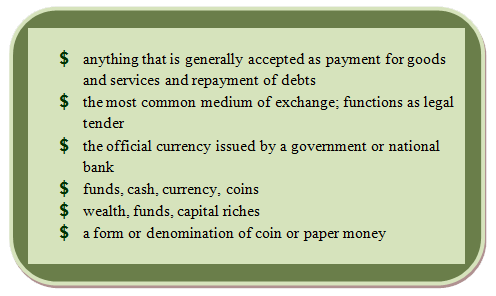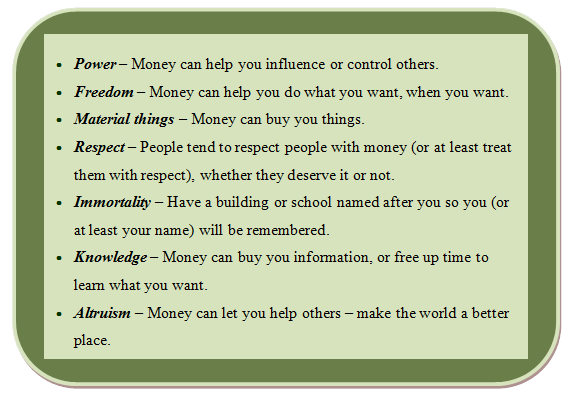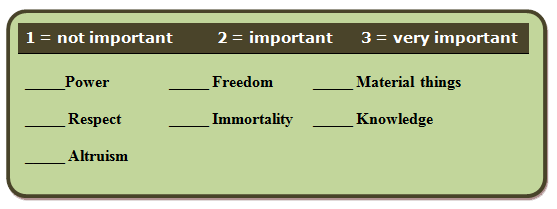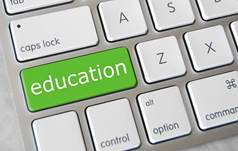Course Overview
Welcome to Financial Literacy, a course designed to help you make the most of your money. You will learn personal financial planning, budgeting, banking, using credit wisely, how to protect your money, making money, consumerism, investing and philanthropy.
INTRODUCTION TO FINANCIAL LITERACY
Unit Overview
In this unit, the student will learn about money and learn that money means different things to people.
Money, Money, Money – What is Money? Why is it so Important to Us?
Common definitions include:
 |
Mankind has used many different forms of money. In the beginning people bartered or exchanged items for goods and services. In China, shells were used as money in 1,000 B.C. along with banknotes made of leather around 118 B.C. Silver was used about 500 B.C. in Lydia or Turkey. The Greek, Persian, Macedonian and Roman empires used coins composed of bronze, gold and silver. North American Indians exchanged gifts and Wampum - strings of beads made of clam shells. The paper money we use today was introduced after the Federal Reserve Act of 1913. Today electronic money or digital cash is used, allowing buying and selling over the internet.
Read the Federal Reserve Education PDF document Money, Banking and Monetary Policy Policy.
Based on the information presented in Money, Banking and Monetary Policy answer Assessment questions 1-9.
What Does Money Mean to You?
Hamburger & fries? New car? Concert tickets? College education? Status? Prestige?
Money can mean many different things such as:
 |
Read the Money Means Different Things to Different People PDF document.
What is Most Important/Least Important to You?
Using a scale of 1-3, rank each of the meanings. There is no right or wrong answer.
 |
What meanings did you rank as most important? Least important? How you feel about what money is used for can influence how you make and spend money. For example, if Susie ranked knowledge high, she will probably spend money on education and may even have a career in education. If Bruce ranked altruism high, he will more than likely spend money on causes that help others and might have a career in a profession that improves the life of others like medicine or social work.
Answer Assessment questions 10-13.
 |
Money means different things to different people just as there are many different ways people use money. Understanding what money means to you will help guide you when you are making decisions about money. Some people are always broke while others have money to spend. What is the difference? Could it be rich parents or a good paying job? More than likely it is not the amount of money you have so much as it is what you do with the money. People who are financially successful know how to manage their money and how to make their money work for them. In other words, they are financially literate. |
Again, Welcome to Financial Literacy, a course designed to help you make the most of your money. You will learn personal financial planning, budgeting, banking, using credit wisely, how to protect your money, making money, consumerism, investing and philanthropy.
Answer Assessment question 14 by completing ONE of the projects listed below.
Imagine that instead of money everyone used the barter system to obtain goods and services. Explain what a typical day in a teenager’s life might be like. Use your imagination. Your answer should reflect an understanding of how bartering works as well as the problems associated with bartering. Paper should be at least two pages in length. When complete send attachment to your teacher.
Project #2 Interview 5 adults over 30 and 5 teenagers between the ages of 13 and 19 about the meaning of money. Ask them why they need money, what they use money for, why money is important to them and what they would do if they inherited a lot of money. Summarize the results of all four questions. Did the adults answer the questions differently than the teenagers or were they similar? Explain. |
